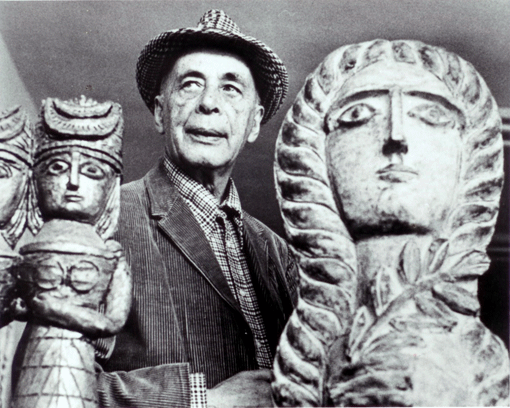I don’t know why I’m writing this. It all started when I was telling someone about Tibor Jankay (1899-1994), an artist I love.
He has an amazing story about escaping a train to Auschwitz by chiseling a hole into the floor and sneaking out of the bottom of a boxcar. He was the only one to go. The others were too scared and possibly didn’t really believe their fate waiting for them at the camp. It was unbelievable after all.
But Tibor left and hid in haystacks, under cars and houses of goodhearted people, who exchanged with him food for his beautiful drawings.
And he survived. One of the few in comparison to those who perished.
He lived a long life too, in Venice, California, and he taught at Pepperdine.
Anyway, it got me thinking about how many survivors are even left.
Not many!
When there were a lot more around, people were getting so sick of us all saying, “Never forget!” but it seems like we really need to say that now. Once all the survivors are dead, who will be left to remember?
No one.
Meanwhile, we seem to gain deniers.
A couple/few years ago, I was helping my friend move to Joshua Tree, I’ve probably mentioned that here before, but I’ve never told this story before.
I’m going to now.
I arrived a few days before my friend got to her new house because she was driving across country and her furniture was getting there before she was. I also wanted to get her house ready: cleaning out the fridge, fixing broken moulding, putting her things away in the rooms they belonged in, and just generally giving her a head-start into her move.
During those few days, I spent a little time with the property’s handyman, Charles. I was making sure he was doing his tasks — electrical tasks, fixing door hinges, and the crooked duct over the stove and the swamp cooler, things like that. And he was a chatty guy, which was okay. I liked him and we had a lot of interesting things to talk about.
Charles seemed to be intelligent about a vast number of subjects: sociology, science, psychology and philosophy, but was a bit older, so you’d expect that. Older than me anyway – late 50s.
So we got to know each other, and at some point we began to talk about family. He mentions that he was born in Germany. I had a good friend from Germany, so I mention that, and that my father was German. Now, my father was of German descent, but I forget to say that part. I wasn’t paying attention at this point. We were both fixing something at the same time and I just wasn’t paying close attention to what I said and I forget I said it.
Anyway, somehow or another the war comes up and I say that my dad fought in WWII and Charles asks, “For which side?”
Red flags start to come up and I stop what I’m doing, and, I reacted the way I think you’re supposed to react. Slightly defensive.
“Whadduyu mean, ‘which side did he fight for?’ The Allies!”
He tells me that his dad fought on the German side.
It got uncomfortable in the room (for me), as he started assuming that my dad was born in Germany – not an American – and was probably conflicted about fighting for the Americans.
I quickly tell him that my dad is German by blood, but that the family was here since before the colonies were formed. I just meant my heritage on my father’s side was German. That was all.
Well, next thing I knew, he went into a rant about how the Americans made such mistakes in the war, PLUS exaggerated about how many Jews were killed in the camps. He was paring down the numbers to 20,000 and even citing Leuchter’s findings as “proof” of no gas chambers – that’s the guy who is the subject of an Errol Morris documentary called Dr. Death. He helped to streamline ways to kill criminals on death row and later became an “expert” on the Holocaust. It’s so bogus, it makes ridiculous seem ludicrous.
But anyway. Charles. He’s going on and on, and I’m just standing there, listening. What would you call this guy, I’m thinking. A denier, or an Nazi apologist? Does it matter?
So many things ran through my head, I’ll be honest. I was scared to say anything. I thought about nodding and pacifying him. He wasn’t staying much longer. That would be easiest. But I would be very upset with myself.
The alternative would be to stand up to this 6’4″ guy with tattoos, that now I notice! No swastikas, but lots of German crosses. I size him up as a nationalist. And I am so sad because I liked him. I mean, I still like him, but now I don’t like this.
He has such a strong presence and personality, and I had been more on the quiet/shy side, and I decide that I can’t just stand there and listen to his bullshit. I didn’t want to be mean to him, but he was starting to say things like, “Them, ” and “Those people…” I had to yell at him a little bit, so…
Finally, I got my wits about me and yelled, “STOP!”
But tears came bursting out while I muttered out my semi-loud, partially angry – more hurt than angry little word.
And I heard it in the room. It wasn’t forceful enough, so, I brought it. I brought it big and I brought it loud, and continued.
“Charles, stop. Stop talking! Shut up! Stop it! I am one of THEM! I am Jewish! So Shut your mouth! Stop this bullshit now!” I said between violently trying to catch my breath because I was crying so hard.
But at least I was real loud. And he did shut up. But I was still disappointed in myself for crying like a wimp. I wanted to be scary.
But do you know what this guy did?
He came up to me and took my hand, bent down on the ground and started to pray, “Baruch atah Adonai elohaynu melech ha’olam…” and asked me to forgive him for how insensitive he was being.
I really didn’t know what to make of it when he did that first bit. I was taken by surprise. I don’t think I let him finish. I was offended and confused. I don’t know what I was, but right after that was when he asked me to forgive him, and I did. (Forgive but don’t forget.)
And I thought about Tibor.
There is a super special amazing documentary about Tibor called, Tibor Jankay: The Art of Survival. In it, he said that he forgives Hitler because he loves everybody, even people he hasn’t even met yet. He was quite a miracle of a person that you’d have to witness to understand. A beautiful person. I mean, that’s an understatement.
After everything he had been through and all the loss he experienced. Everything he saw. Wow. It’s hard to wrap your mind around how he embraced his community and students, people and art.
Now Charles. Maybe he wasn’t such an expert on those subjects after all. At least not some of the stuff. And it was a little too late. I knew what he thought now, but that didn’t mean the conversation was over.
He told me about how he used to live in the guesthouse in Germany of a Jewish family that invited him in every Shabbos to eat with them. That’s how he knew the prayer. He told me he loved the Jewish people, blah blah blah. He backpedaled quite a bit, but eventually we both calmed down and had a seat outside together and lit up a couple of cigarettes.
Nobody left or ran off, and I liked that.
Once I found out where he got his information, I told him about the guy’s credentials, which he had no idea about. Plus, it was third-hand knowledge. A guy who knew a guy that read a book told him. That sort of thing.
Bottom line, Charles was German and defensive, and I could understand that. His father fought in the war that Germany lost. I was getting a clearer picture of how he was struggling to compartmentalize his stance on the issues. I think it was good to talk.
When I left him, I have no idea if he was any less insensitive, or if he was just going to watch what he says in front of people in the future.
Well I sure digressed. I was trying to make a point that we are losing survivors.
Yup. We are. We are losing that first-hand knowledge to speak directly to “those” people. Losing that contact to their actual experience, and losing their presence in our generation.
Meanwhile, we gain deniers, and that scares me. They outnumber the remaining survivors, so it’s important that we annoy people to remember, or at least, never forget.




That’s a handful of marbles that you can put back in your bucket. Reading your story helped me find one of mine. Thank you.